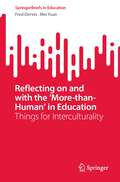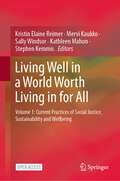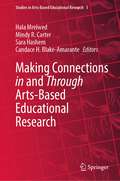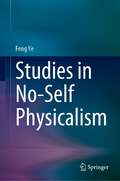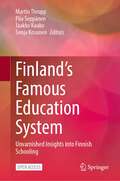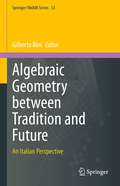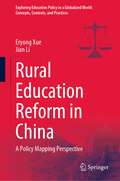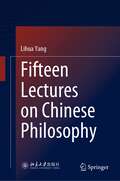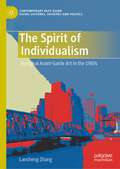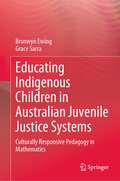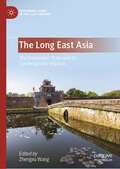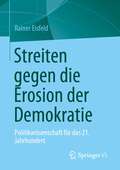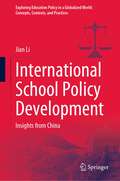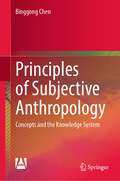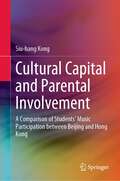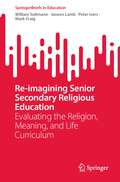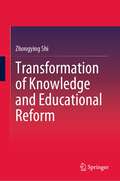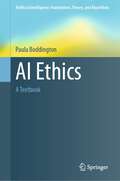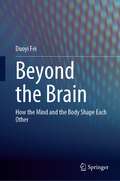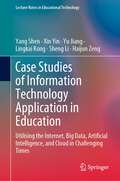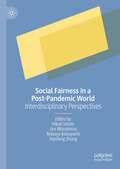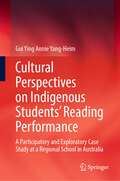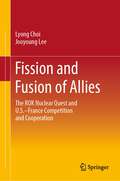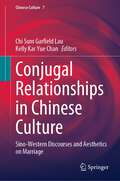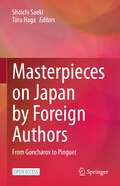- Table View
- List View
Reflecting on and with the ‘More-than-Human’ in Education: Things for Interculturality (SpringerBriefs in Education)
by Fred Dervin Mei YuanThis book examines today’s central and yet often misunderstood and misconstrued notion of interculturality. It specifically focuses on one aspect of intercultural awareness that has been ignored in research and education: the presence and influence of things on the way we experience, do, and reflect on interculturality. This book provides the readers with opportunities to engage with interculturality by reflecting on how our lives are full of things and entangled with them. It urges teachers, teacher educators, scholars, and students to open their eyes to the richness that the more-than-human, with which we can reflect, has to offer for intercultural communication education.
Living Well in a World Worth Living in for All: Volume 1: Current Practices of Social Justice, Sustainability and Wellbeing
by Kristin Elaine Reimer Mervi Kaukko Sally Windsor Kathleen Mahon Stephen KemmisThis open access book is the first of a two-volume series focusing on how people are being enabled or constrained to live well in today’s world, and how to bring into reality a world worth living in for all. The chapters offer unique narratives drawing on the perspectives of diverse groups such as: asylum-seeking and refugee youth in Australia, Finland, Norway and Scotland; young climate activists in Finland; Australian Aboriginal students, parents and community members; families of children who tube feed in Australia; and international research students in Sweden. The chapters reveal not just that different groups have different ideas about a world worth living in, but also show that, through their collaborative research initiative, the authors and their research participants were bringing worlds like these into being. The volume extends an invitation to readers and researchers in education and the social sciences to consider ways to foster education that realises transformed selves and transformed worlds: the good for each person, the good for humankind, and the good for the community of life on the planet. The book also includes theoretical chapters providing the background and rationale behind the notion of education as initiating people into ‘living well in a world worth living in'. An introductory chapter discusses the origins of the concept and the phrase.
Making Connections in and Through Arts-Based Educational Research (Studies in Arts-Based Educational Research #5)
by Hala Mreiwed Mindy R. Carter Sara Hashem Candace H. Blake-AmaranteThis book explores the connections made in and through arts-based educational research through four themes: socially engaged connections, cultural connections, personal and pedagogical connections, and making connections during the COVID-19 pandemic. It emerges from the 3rd bi-annual 2020 Artful Inquiry Research Group symposium on the theme of “connections”. The symposium brought together artists, community members, teachers, students, and researchers through a virtual platform to examine the way(s) in which the arts can help connect people, ideas, and spaces/places in a pandemic reality. Art plays a predominant role in each chapter as authors weave their research and art-based understandings together. This book is a valuable teaching resource for undergraduate and postgraduate courses in teaching, anthropology, digital ethnography, autoethnography, cultural studies, and communications. It is of interest to higher education students, academic researchers, and teachers exploring arts-based methodologies in the fields of creative practice and creativity studies, communications, critical studies, sociology, sciences, teacher education, and the arts.
Studies in No-Self Physicalism
by Feng YeThis book demonstrates how a radical version of physicalism (‘No-Self Physicalism’) can offer an internally coherent and comprehensive philosophical worldview. It first argues that a coherent physicalist should explicitly treat a cognitive subject merely as a physical thing and should not vaguely assume an amorphous or even soul-like subject or self. This approach forces the physicalist to re-examine traditional core philosophical notions such as truth, analyticity, modality, apriority because our traditional understandings of them appear to be predicated on a cognitive subject that is not literally just a physical thing.In turn, working on the assumption that a cognitive subject is itself completely physical, namely a neural network-based robot programmed by evolution (hence the term ‘No-Self’), the book proposes physicalistic theories on conceptual representation, truth, analyticity, modality, the nature of mathematics, epistemic justification, knowledge, apriority and intuition, as well as a physicalistic ontology. These are meant to show that this No-Self Physicalism, perhaps the most minimalistic and radical version of physicalism proposed to date, can accommodate many aspects that have traditionally interested philosophers. Given its refreshingly radical approach and painstakingly developed content, the book is of interest to anyone who is seeking a coherent philosophical worldview in this age of science.
Finland’s Famous Education System: Unvarnished Insights into Finnish Schooling
by Martin Thrupp Piia Seppänen Jaakko Kauko Sonja KosunenThis open access book provides academic insights and serves as a platform for research-informed discussion about education in Finland. Bringing together the work of more than 50 authors across 28 chapters, it presents a major collection of critical views of the Finnish education system and topics that cohere around social justice concerns. It questions rhetoric, myths, and commonly held assumptions surrounding Finnish schooling.This book draws on the fields of sociology of education, education policy, urban studies, and policy sociology. It makes use of a range of research methodologies including ethnography, case study and discourse analysis, and references the work of relevant theorists, including Bourdieu and Foucault. This book aims to provide a critical, updated and astute analysis of the strengths and challenges of the Finnish education system.
Algebraic Geometry between Tradition and Future: An Italian Perspective (Springer INdAM Series #53)
by Gilberto BiniAn incredible season for algebraic geometry flourished in Italy between 1860, when Luigi Cremona was assigned the chair of Geometria Superiore in Bologna, and 1959, when Francesco Severi published the last volume of the treatise on algebraic systems over a surface and an algebraic variety. This century-long season has had a prominent influence on the evolution of complex algebraic geometry - both at the national and international levels - and still inspires modern research in the area. "Algebraic geometry in Italy between tradition and future" is a collection of contributions aiming at presenting some of these powerful ideas and their connection to contemporary and, if possible, future developments, such as Cremonian transformations, birational classification of high-dimensional varieties starting from Gino Fano, the life and works of Guido Castelnuovo, Francesco Severi's mathematical library, etc. The presentation is enriched by the viewpoint of various researchers of the history of mathematics, who describe the cultural milieu and tell about the bios of some of the most famous mathematicians of those times.
Rural Education Reform in China: A Policy Mapping Perspective (Exploring Education Policy in a Globalized World: Concepts, Contexts, and Practices)
by Eryong Xue Jian LiThis book contextually explores the rural education reform in China from a policy mapping perspective. It discusses a wide range of topics in the context of China's rural areas, including rural school layout adjustment, rural teacher development, rural students' all-round education development, vocational education in rural areas, and rural education informatization development. With the challenges outlined and recommendations provided, the chapters offer a holistic view on China’s rural education reform. This book serves as a guide for scholars and researchers who are interested and work in research on China’s rural education reform, administrators, and stakeholders in China's education system and graduate students who major or minor in the field of rural educational policy.
Fifteen Lectures on Chinese Philosophy
by Lihua YangThis book introduces fifteen representative philosophers in ancient China, including Confucius, Laozi, Mencius, Zhuangzi, influential Neo-Taoist scholars, and prominent Neo-Confucian thinkers. It reveals the fundamental problems of each philosopher, clarifies the connotation of the concept as well as the specific reference of the problem, and presents the inherent context and structure of each philosopher’s thoughts. Further, the author analyzes a selection of these ancient philosophers’ main propositions and demonstrates the argumentation and proof processes behind the basic philosophical insights. As such, this book is a valuable academic resource for scholars and the interested readers wanting to gain an in-depth understanding of ancient Chinese philosophy today.
The Spirit of Individualism: Shanghai Avant-Garde Art in the 1980s (Contemporary East Asian Visual Cultures, Societies and Politics)
by Lansheng ZhangThis book is about avant-garde art in Shanghai in the 1980s which challenges the narrative in the current discourse on the appearance of contemporary art in China. Offering fresh perspectives and new insights into the art and the artists of this period, the book includes critical events in Shanghai, that will attract the serious attention of art professionals and collectors. The emergence of the Shanghai art scene in the 1980s mirrors the revitalisation of Shanghai that was tasked to lead China’s economic development trajectory onto the world stage. Shanghai, with its semi-colonial, political, economic and cultural history, including the strong legacy of the early twentieth century modernist art movement, has played a vital role in China’s modernisation and presents itself as a unique case in the evolution of contemporary art in China.
Educating Indigenous Children in Australian Juvenile Justice Systems: Culturally Responsive Pedagogy in Mathematics
by Bronwyn Ewing Grace SarraThis book addresses key issues in the context of the national policy of educating children accused of crimes in Juvenile Courts in Australia. For several decades, National and State Governments in Australia have struggled to define education, constantly seeking to improve the way society applies the concept. This book presents an accurate portrayal of consequences of the education policy of trying to educate troubled children and young people in trouble with the law. It describes the work of juvenile detention centre mathematics teachers and their teaching contexts. It portrays teachers as learners, who ventured with researchers with a theoretical perspective. This book focuses on culturally responsive pedagogies that seek to understand the ways Indigenous children and young people in juvenile detention make sense of their mathematical learning, which, until the time of detention, has been plagued by failure. It examines how the underperformance of Aboriginal and Torres Strait Islander students, and students from low socioeconomic backgrounds are strong determinants of their overrepresentation in the juvenile justice system in Australia. This book presents the argument that if the students’ literacy and numeracy levels can be improved, there is opportunity to build better futures away from involvement in the juvenile justice system and towards productive employment to improve life chances.
The Long East Asia: The Premodern State and Its Contemporary Impacts (Governing China in the 21st Century)
by Zhengxu WangThis book brings together a range of studies that aim at illustrating the ideas, institutions, historical patterns, and contemporary relevance of the social-political system that existed in the main part of East Asia during the premodern era. This is most often known as the Confucian literati-bureaucratic state, the imperial Chinese bureaucratic state, or the Confucian-Legalist state, that was established and endured most notably in China, but also in several East Asian societies such as Korea, Vietnam, Japan. That state and sociopolitical system also greatly shaped state making in several kingdoms in the region – such as Ryukyu and Dali – which were later merged into larger polities. Illuminating the significance of these historical patterns for today, this book will interest political scientists, historians, philosophers, and the general public.
Streiten gegen die Erosion der Demokratie: Politikwissenschaft für das 21. Jahrhundert
by Rainer EisfeldEuropaweit und darüber hinaus unterliegen Demokratien alarmierender Aushöhlung. Rapider wirtschaftlicher, kultureller, politischer Wandel weckt Unsicherheiten und Aggressionen; Politiker, Parteien, selbst Regierungen versuchen Bürger durch systematische Lügen zu täuschen; neoliberale Deregulierungen schwächen die Bereitschaft zum zivilgesellschaftlichen Engagement; schroffe Einkommens- und Vermögensunterschiede treiben die Demokratie in Richtung Plutokratie; fremdenfeindliche Vorurteile polarisieren Gesellschaften; Antiterrorismus-Strategien untergraben bürgerliche Freiheiten; Vetospieler hemmen klimapolitischen Wandel. Zugleich wird seit Jahren gestritten über die Fragmentierung der Politikwissenschaft, ihre zweifelhafte Relevanz und ihre Abkopplung von der breiten Öffentlichkeit. Dieses Buch ist die erste umfassende Studie, die beide Fragenkomplexe miteinander verknüpft und präzise zu ergründen sucht: Wie kann, wie sollte die Politikwissenschaft dem Niedergang der Demokratie in jedem der erwähnten Bereiche entgegenwirken?Rainer Eisfelds Antworten lauten: Entwicklung einer Wissenschaftskultur öffentlichen Engagements; Auseinandersetzung mit Ursprüngen, Mustern und partizipativer Bewältigung durchgängigen Wandels als Hauptgegenstand der Disziplin; kategorisches Auftreten gegen Tendenzen zu einer Herrschaft notorischer Lügner; Konzentrierung der Forschungsprioritäten auf die Schlüsselbereiche, in denen Demokratie sich zurückbildet; für Laien zugängliche Darstellung gewonnener Resultate; Erweiterung der Analyse zur Präsentation konkreter Gestaltungsvorschläge.Dazu, so Eisfelds Fazit, bedarf es einer Disziplin, die als normativ orientierte, empirisch gestützte Demokratiewissenschaft brisanten Problemen den Vorrang einräumt vor ausgefeilten Methoden und bürgernaher Relevanz vor immer weiterer Spezialisierung.
International School Policy Development: Insights from China (Exploring Education Policy in a Globalized World: Concepts, Contexts, and Practices)
by Jian LiThis book investigates the international school policy reform in China from various perspectives. In recent years, international schools, international classes, international departments, and various international education projects have emerged in the field of education in China. This book explores and analyzes the idea of international schools, and discusses different aspects of the conceptual model of international education policy development in China, including international school policy, student cultivation, teacher cultivation, school management, curriculum, and quality assessment of international schools. In addition, this book offers a comprehensive, systematic, and practical perspective on shaping China’s international school policy development and management. This book serves as a guide for scholars and researchers who are interested, and work in, research on internationalization development in China, administrators, and stakeholders in China's education system, and graduate students who major or minor in the field of internationalization development in China.
Principles of Subjective Anthropology: Concepts and the Knowledge System
by Binggong ChenThis book puts forward the concept of “subjective anthropology” and outlines a theoretical system that will allow subjective anthropology to qualify as a new academic discipline in its own right. In an effort to respond to the field’s proper role as the science of humanity, subjective analysis has been introduced into the study of anthropology. The book fills two distinct gaps in our knowledge and understanding of modern man, offering detailed descriptions of personality and of groups, while also advancing the theory of “structure and choice.” The book formulates seven basic principles of subjective anthropology and divides anthropology into three major branches: subjective anthropology, cultural anthropology, and biological (or physical) anthropology, which can be further divided into sub-branches. The book pursues three key goals: advancing and developing the theoretical system of subjective anthropology, reconstructing the discipline of anthropology, and establishing a Chinese anthropology with Chinese characteristics, Chinese visions, and Chinese styles.
Cultural Capital and Parental Involvement: A Comparison of Students’ Music Participation between Beijing and Hong Kong
by Siu-hang KongThis book uses Pierre Bourdieu’s cultural capital model as a theoretical framework for exploring how students in Beijing and Hong Kong perceive parental influences—their parents’ cultural capital and support—on their participation in musical activities. By studying students’ perceptions of their parents’ cultural capital and support for their musical activities, this book revisits the applicability of Bourdieu’s cultural capital model in the contemporary Chinese context and reveals how inequality in terms of parental cultural capital governs parents’ support and influences the intergenerational transmission of cultural capital, which in turn contributes to inequality in terms of students’ cultural capital.
Re-imagining Senior Secondary Religious Education: Evaluating the Religion, Meaning, and Life Curriculum (SpringerBriefs in Education)
by William Sultmann Janeen Lamb Peter Ivers Mark CraigThis book examines and reports the findings regarding the level of satisfaction by students, teachers and parents with an innovative senior secondary Religious Education curriculum ‘Religion, Meaning and Life’ (RML). The stimulus for RML is found in the changing profile of students within faith-based schools and the motivation of school authorities to be inclusive and responsive to changing needs and priorities of students and families. Curriculum practices typically mirror this continuing renewal as community expectations give rise to innovation in curriculum practice. This concept of continuity and discontinuity is evidenced in the field of Religious Education,, which recognizes religious plurality while giving preference to an imagination centred on inclusion, hospitality and respectful dialogue. In this context, new pathways are being explored as the reality and significance of Religious Education in faith-based school remain a priority for Christian organizations in Australia.Mindful of the diversity of expectations within the Catholic school, the curriculum initiative of RML was developed, supported and implemented. The La Salle Academy of the Australian Catholic University reviewed this senior secondary curriculum across three years and presents in this book an independent, evaluative report of the findings, together with insights for implementation at scale and associated applications across Christian faith-based institutions.
Transformation of Knowledge and Educational Reform
by Zhongying ShiThis book defines the concept of knowledge transformation, describes the historical process of knowledge transformation, and analyses its deep influence on education theory and practice by virtue of multiple discipline resources. The general scope of this book encompasses the philosophy of education, curriculum studies, and education reform research. It enables readers to understand how 'hidden' epistemological factors have changed or reshaped the education system throughout history and at present.
AI Ethics: A Textbook (Artificial Intelligence: Foundations, Theory, and Algorithms)
by Paula BoddingtonThis book introduces readers to critical ethical concerns in the development and use of artificial intelligence. Offering clear and accessible information on central concepts and debates in AI ethics, it explores how related problems are now forcing us to address fundamental, age-old questions about human life, value, and meaning. In addition, the book shows how foundational and theoretical issues relate to concrete controversies, with an emphasis on understanding how ethical questions play out in practice. All topics are explored in depth, with clear explanations of relevant debates in ethics and philosophy, drawing on both historical and current sources. Questions in AI ethics are explored in the context of related issues in technology, regulation, society, religion, and culture, to help readers gain a nuanced understanding of the scope of AI ethics within broader debates and concerns. Written with both students and educators in mind, the book is easy to use, with key terms clearly explained, and numerous exercises designed to stretch and challenge. It offers readers essential insights into the evolving field of AI ethics. Moreover, it presents a range of methods and strategies that can be used to analyse and understand ethical questions, which are illustrated throughout with case studies.
Beyond the Brain: How the Mind and the Body Shape Each Other
by Duoyi FeiDifferent from traditional research on the mind-body problem often discussed from an epistemological viewpoint, which assumes that mental processes are internal to the person, this book demonstrates the crucial role of contextual relevance in the workings of the mind and illustrates how mind emerges from the individual's interactions with her physical, social, and cultural environments. It also develops the interpersonal and social aspects of embodied mind. The body that creates meaning is not only an emotional, kinesthetic, and aesthetically experiencing body; the body that creates meaning is a social body. It suggests that mind-body relations are not only achieved through the interaction between our own mind and body, but by other minds in our intersubjective interactions. It is related to epistemology, metaphysics, ethics, value theory, action theory, and the philosophies of mind, science, logic, and technology. The readership may include graduate and undergraduate students studying philosophy, law, political science, sociology, psychology, etc., educators, researchers, scholars, and anyone who shows an interest in philosophy.
Case Studies of Information Technology Application in Education: Utilising the Internet, Big Data, Artificial Intelligence, and Cloud in Challenging Times (Lecture Notes in Educational Technology)
by Yang Shen Xin Yin Yu Jiang Lingkai Kong Sheng Li Haijun ZengThis book includes 43 case studies showcasing the application of basic education informatization. It shares the experiences of 43 schools in the construction and application of educational informatization in various regions in China. It aims to promote the balanced development of education and expand the coverage of quality education resources. This book also highlights the achievements of these schools in constructing school-based resources, and changing teaching modes and optimizing classroom teaching. This collection of case studies not only reflects the current trend of informatization application moving from 'universal application' to 'integrated innovation' but also uncovers the potential of applying information technology to transform education processes, innovate education environment, and optimize education governance.
Social Fairness in a Post-Pandemic World: Interdisciplinary Perspectives
by Hikari Ishido Jiro Mizushima Masaya Kobayashi Xiaofang ZhangThis book brings a much-needed re-examination of the concepts of social fairness and justice in light of the COVID-19 crisis. Through careful analysis of issues as diverse as the allocation of vaccines through the global system COVAX, women and gender, migrants and refugees, the environment, and social justice, the authors bring novel perspectives on openness, freedom, and well-being. This ambitious collection combines political, economic, historical, philosophical, and cultural analyses to examine whether it is possible to envision a “fair society” after the global COVID-19 pandemic.
Cultural Perspectives on Indigenous Students’ Reading Performance: A Participatory and Exploratory Case Study at a Regional School in Australia
by Gui Ying Yang-HeimThis book explores the contextual, particularly cultural-related, factors that may impact reading outcomes of young Indigenous learners in their early years, underpinned by the conceptual framework of cultural capital originated by Bourdieu. By drawing upon a participatory and exploratory case study, conducted at a regional school in Australia over a period of six months, it highlights the challenges that Indigenous students face in reading, and how the contextual factors contribute to Indigenous students’ development in reading skills and their reading performance. This book helps readers to gain a better and deeper understanding of Indigenous culture, the importance of the role that culture plays in Indigenous children’s literacy education, and how it shapes the way they learn and think.
Fission and Fusion of Allies: The ROK Nuclear Quest and U.S.–France Competition and Cooperation
by Lyong Choi Jooyoung LeeThis book traces the development of U.S-led global nuclear non-proliferation diplomacy during the three decades since the Eisenhower’s “Atoms for Peace” in 1953. The U.S. non-proliferation efforts had diverse obstacles. It had to prevent nuclear states’ export of nuclear technology while dissuading non-nuclear states from developing nuclear weapons. In addition, building non-proliferation regime was not always its top foreign policy priority. To understand the complex process of non-proliferation, the book examines the relations among three different actors in the nuclear field: a global non-proliferation regime builder (U.S.), a potential nuclear proliferator (France) and a would-be nuclear state (Republic of Korea). In tracing how they developed nuclear strategies, conflicting and compromising with one another, the book pays special attention to how the transforming Cold War structure in the 1970s not only affected foreign policies of the involved countries but also complicated their relationship. The exploration ultimately highlights the multidimensional nature of international discussion on nuclear non-proliferation as the ROK’s nuclear development attempts, U.S. non-proliferation efforts, and the U.S.-France nuclear technology cooperation in the 1970s were all deeply connected.
Conjugal Relationships in Chinese Culture: Sino-Western Discourses and Aesthetics on Marriage (Chinese Culture #7)
by Chi Sum Garfield Lau Kelly Kar Yue ChanThis book reviews the presentation of conjugal relationships in Chinese culture and their perception in the West. It explores the ways in which the act of marriage is represented/misrepresented in different literary genres, as well as in cultural adaptations. It looks at the gendered characteristics at play that affect conjugal relationships in Chinese societal practices more widely. It also distinguishes between the essential features that give rise to nuptial arrangements from the Chinese perspective, looking at what in which Sino and/or Western mentalities differ in terms of notions of autonomy in marriage. It excavates the extent to which marriage is constituted in forms of transaction between female and male bodies and asks under what circumstances wedding ceremonies constitute archetypal or counter-archetypal notions in pre-modern and modern society. Authors cover a range of fascinating cultural topics, such as posthumous marriage (necrogamy) as an ancient and popular folk culture from the perspective of Confucian ideology, as well as looking at marriage from ancient to present times, duty and rights in conjugal relations, inter-racial and inter-cultural marriage, widowhood in Confucian ideology, issues of legitimacy in marriage and concubinage, the taboos surrounding divorce and re-marriage, and conjugal violence. The book serves to revisit the cultural connections between marriage and various art forms, including literature, film, theatre, and other adaptations. It is a rich intellectual resource for scholars and students researching the historical roots, cultural interpretations, and evolving aspects of marriage as shown in literature, art, and culture.
Masterpieces on Japan by Foreign Authors: From Goncharov to Pinguet
by Shōichi Saeki Tōru HagaThis open access book includes forty-one chapters about foreign observers’ discourses on Japan. These include a wide range of perspectives from the travelogues of curious visitors to academic theses by scholars, which offer us a broad spectrum of contents, reflecting a variety of attitudes toward Japan. The works were written during the period from the 1850s to the 1980s, a timespan during which Japan became, in stages, more open to the outside world after a long isolation under the Tokugawa shogunate. From the perspective of “Japanology,” one can discern three distinct periods of rising interest in the country from abroad. The first tide of such interest came shortly after the opening of Japan, when various foreign travelers, including those who could not be included in this book, came over and wrote down their impressions of the country—which was, for them, a land of mystery and mystique, which had just opened its doors to them. The second wave arose at the beginning of the twentieth century, just after the Russo-Japanese War, when Japan again generated a remarkable surge of interest as a “miracle” in Asia that had pulled off the wondrous feat of defeating a white superpower. The third wave was more recent, which took place from the late 1960s to the 1980s, a period of high economic growth when the “miracle” of Japan’s remarkable economic recovery from the defeat of World War II attracted enthusiastic and curious attention from the outside world once again. It is not the intention of this book to directly highlight such historical transitions, but these forty-two brilliant mirrors (forty-one chapters, including forty-two discourses), even when looked in casually, provide us with unexpected insights and various perspectives. Shōichi Saeki (1922–2016) was Professor Emeritus, the University of Tokyo. Tōru Haga (1931–2020) was Professor Emeritus, International Research Center for Japanese Studies.
